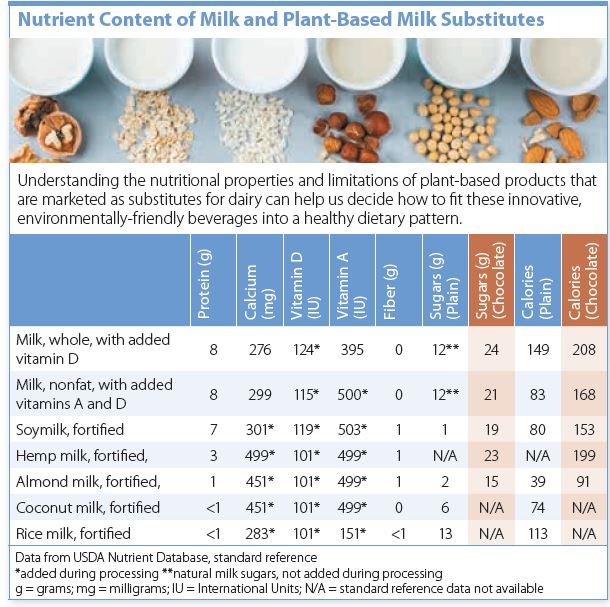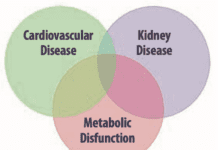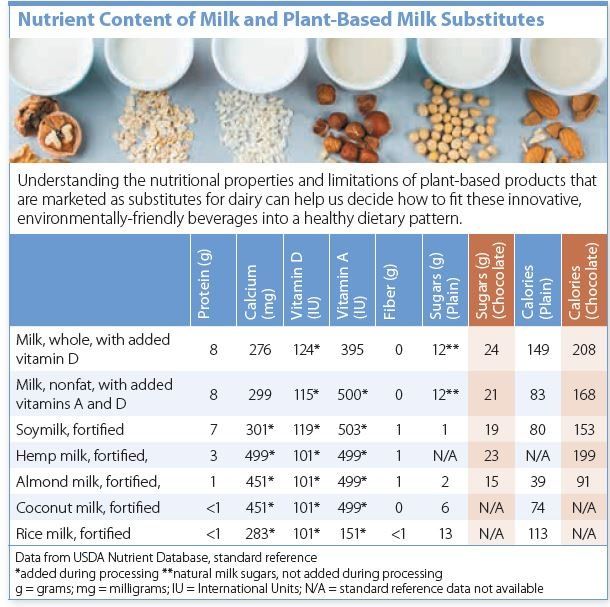The market for plant-based alternatives to dairy products continues to grow, as lactose intolerance, dairy allergy, veganism, environmental concerns, and other factors lead Americans to look for alternatives to dairy. So where do these beverages fit into a healthy dietary pattern?
How They are Made: To understand the nutrient profiles of plant-based beverages, one first needs to know how they are made. The raw materials (nuts, grains, legumes, or seeds) are soaked in water and ground (or ground and then soaked). The resulting slurry is strained to remove solids, and then any flavorings, sweeteners, and desired nutrients can be added. Thickening agents (such as locust bean gum, carrageenan, or xanthan gum), and stabilizers to keep the mixtures from separating, are often required. The products undergo heat treatment that kills any microorganisms, and they are packaged for market.
This process results in a beverage with a nutrient profile significantly different from the original plant food.
Nutritional and Environmental Benefits: The nutritional properties of these beverages depend on the plant source, processing, and fortification. A plant source like hemp, for example, may provide omega-3 and omega-6 fatty acids, and soy milk may contain soy isoflavones, which have been purported to be associated with a range of health benefits. Most milk substitutes are fortified with calcium and vitamins (such as vitamins A and D) to make them more similar in to cow’s milk.
Plant-based milk alternatives are thought to have a lower impact on the environment than dairy products, since production of plant foods emits less greenhouse gases and requires less land than production of meat and dairy products, by weight.
Nutritional Concerns: If milk substitutes are being used to replace cow’s milk in the diet, it’s important to be aware that they are not nutritionally equivalent. Only soy has a
protein level approaching that of dairy, for example, and dairy also has more phosphorus, potassium, and vitamin B12. Infants fed low-protein milk substitutes have been known to develop malnutrition. “Dairy products are an important source of nutrients that Americans tend to fall short on,” says Alice H. Lichtenstein, DSc, senior scientist at Tufts’ Human Nutrition Research Center on Aging and executive editor of Tufts Health & Nutrition Letter. “It is important to select plant-based milk substitutes fortified with calcium and vitamins A and D.”
Consumers should also be aware that drinking almond milk is not equivalent to eating almonds, for example. While whole plant foods are rich in beneficial compounds such as micronutrients and fiber, many of these (particularly fiber) are lost when they are processed into drinks.
When choosing plant-based beverages, be aware that many have significant amounts of added sweeteners. “High intake of added sugars is associated with excess weight gain and a range of chronic diseases including heart disease and insulin resistance,” says Lichtenstein.
There are non-nutritive concerns to consider as well. Many people who are allergic to dairy protein are also allergic to soy, and people with nut allergies should avoid nut-based beverages. Also, high levels of inorganic arsenic have been found in many rice crops, and one study found levels of this contaminant above the standard limits for drinking water in all 19 rice milks tested.
Enjoy a variety of plant-based beverages in addition to (or instead of) milk, but check labels for nutritional pros and cons.


























